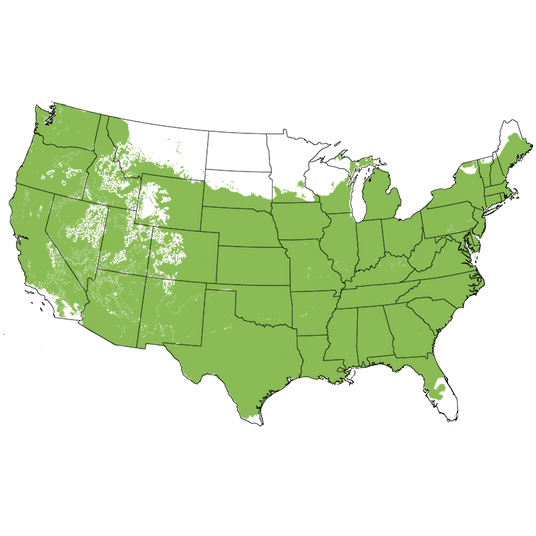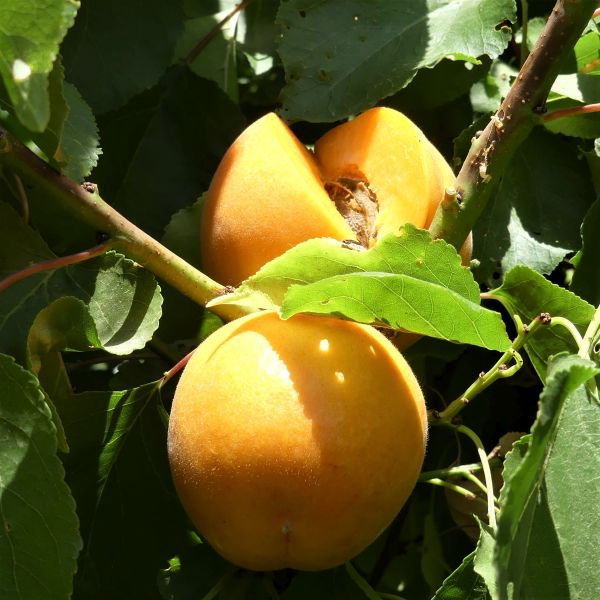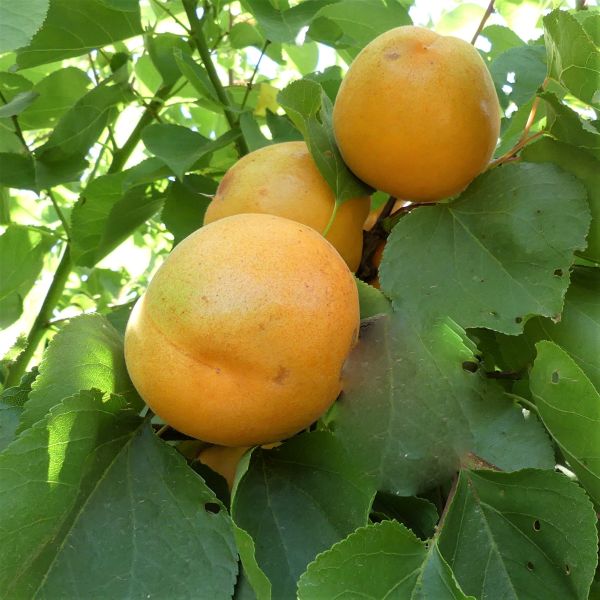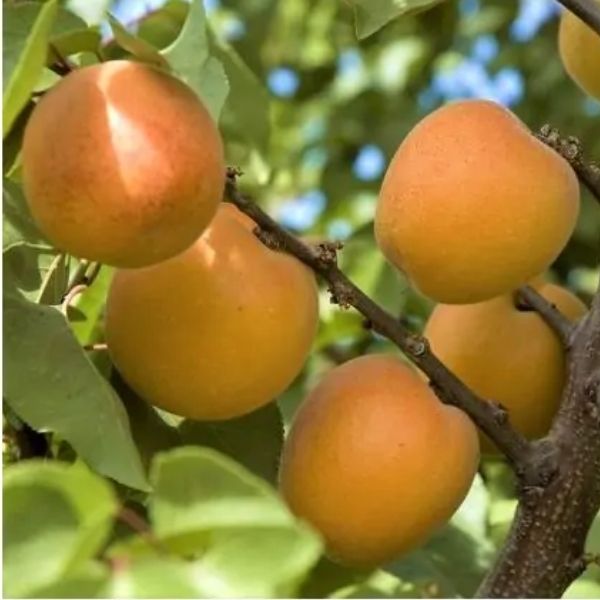Tomcot Apricot Tree
Prunus armeniaca 'Tomcot'
Delivery and Shipping
Delivery and Shipping
Preorder Shipping Schedule
We ship your plants when it's safe to transport them to your zone. Dates are estimated and subject to weather delays.
| Zone 3-4 | Week of March 30th |
| Zone 5 | Week of March 16th |
| Zone 6 | Week of March 2nd |
| Zone 7-12 | Week of February 23rd |
Shipping Rates
Ships in 3-4 business days • Tracking provided • Weather protected
| Under $50 | $9.99 |
| $50 - $99.99 | $14.99 |
| $100 - $149.99 | $16.99 |
| $150 - $198.99 | $24.99 |
| $199+ | FREE |
✓ Zone-specific timing • ✓ Professional packaging • ✓ Health guarantee

Plant Sentry™ Protected
Your order is protected by our compliance system that:
- Prevents restricted plants from shipping to your state
- Ensures plants meet your state's agricultural requirements
- Protects gardens from invasive pests and diseases
Great-Tasting, Productive Tomcot Apricot
- Early Mid-Season
- 500 Chill Hours
- Widely Adaptable
- Orange Freestone
- Early Harvest Season
- Long Season of Bloom
- Resists Late Frost
- Old-Fashioned Apricot Flavor
- Welcome Fresh Eating
- Excellent Baking, Canning, Freezing
- Reliable and Productive
- Attractive, Long-Lasting Spring Blooms
- Partially Self-Pollinating Bigger Crops With Another Variety Nearby
Mmm...who can resist the taste of a freshly picked Apricot grown in your backyard? These days, people not only crave this richly rewarding flavor experience; they also want to shore up food security.
Tomcot Apricot (Prunus armeniaca 'Tomcot') is experiencing a rapid rise in popularity with home gardeners in the historically more marginal climate zones. This recommended variety offers unrivaled early fruit and is proven to be a dependable setter.
Plant with a partner to grow a large, reliable harvest of beautifully large, sweet, orange fruit. Both firm and lustrous, pretty Tomcots feature a trace of blush that develops on the side that is exposed to the sun.
With a long bloom period, this is a dependable setting variety. Tomcot is gaining traction in the home garden market because people want fruit set to occur faithfully year after year.
With sweet flesh and firm flavor, Tomcot fruit is also easy to prepare. The freestone pit that pulls away cleanly from the flesh and really helps to speed up the process.
Go ahead and enjoy your fill of fresh fruit, then slice the rest to can or freeze for summertime taste in the middle of winter. Tomcot starts off your apricot season with plenty of fruit, especially if you plant a pollination partner nearby.
Tomcot fruit tree is partly self-fruitful, and will produce larger crops if cross-pollinated by another variety. Early mid-season Tomcat Apricot will be ready for harvest, 2-3 weeks before Wenatchee Moorpark and days before Goldstrike and Goldbar.
No wonder Tomcot Apricot is gaining in popularity! Order from the fruit tree experts at Nature Hills right away if you see it in stock on our site.
How to Use Tomcot Apricot in the Landscape
Squeeze all the value you can from your investment in property. Put your sunshine and soil to work growing food for your family and friends.
Add early Tomcot Apricot with a mid-season Moorpark and late-season Autumn Glo in an orchard planting. You'll love having a long season of fresh fruit with successive harvests from your trio of trees.
Keep them as compact as you like with good high-density planting summer pruning techniques. Be sure to check out our Garden Blog and videos online to learn more about small space gardening!
Children love learning about fruit...and you'll appreciate knowing exactly how your crops were grown. You might just be surprised at how pretty a Tomcot Apricot tree is with showy spring blooms and gorgeously glossy fruit that hangs from the branches like jewels.
Edible Landscaping is a valuable garden trend that is only getting more popular. Call your Tomcot an accent tree and place where you'll see the developing harvest.
Gain beauty, food and a killer conversation starter all in one! Plant a few fruiting trees in a mulched island bed "stolen" from the front lawn.
Tomcots make excellent preserves, pies, smoothies, and fruit leather. Try them in fresh salads, and chop them to include in special salsas and sauces.
Consider selling excess fruit at farmer's markets. With firm flesh, these great-tasting apricots ship and store well.
#ProPlantTips for Care
Give them a planting site with full sun, well-drained soil and good air circulation. Apricots love all day sun, but need at least six hours of direct sunlight a day.
Tomcot's blooms display some tolerance to spring frost periods. Avoid planting in low-lying hollows to maximize the chances the blooms will survive short, mild frosts.
Apply Nature Hills Root Booster while planting for "life-long" symbiotic support to the tiny feeder roots. Add a three-inch layer of mulch over the root system, and spread it out three feet past the canopy.
Provide a moderate amount of water. Create a consistent watering schedule, especially during fruit development.
In late fall, prune to sculpt your tree into a goblet-shape. Select wide-spreading lateral branches that are held 45 degree angles as a strong support for the weight of your harvest.
In years with heavy fruit set, thin the fruit early on to allow full-size development. Allow four inches between each piece of fruit.
Keep your tree smaller by tip pruning for size control. Make this an annual summer prune for high density planting.
Don’t wait to order your Tomcot Apricot. We sell out of our fruiting plants extremely quickly.
Apricot Tree Frequently Asked Questions
How long does it take for Tomcot Apricot Trees to bear fruit?
Nature Hills Nursery sells fruit trees with mature root systems that are already three to four years old, so you’ll enjoy fruit sooner than you would with younger trees! Expect your young apricot tree (Prunus armeniaca 'Tomcot') to begin fruiting usually by the 2nd-4th year after you plant them.
How Fast Do Tomcot Apricot Trees Grow?
Once your apricot tree has been established (after the first year), it can typically add 12-18 inches of new growth in a growing season. If your plants are adding less than that in a season, it may be worth your while to check the fertility level.
Where do Tomcot Apricot Trees Grow Best?
Apricot trees grow best in well-drained, fertile soil in at least 6 hours of full sun per day or more. Provide good air circulation and moderate, yet consistent water. They do need very well-drained soil.
Do You Need 2 Apricot Trees to Produce Fruit?
Many apricot trees are self-fertile, however planting more than one apricot tree that blooms at about the same time, boosts yields on both trees and extends your harvest time! The Tomcot Apricot Tree is self-pollinating and doesn't need a pollinator to produce fruit.
Apricot trees that need a pollinator partner will have the appropriate tree(s) listed for you to choose from. Nature Hills Nursery lists pollinators for each tree on the product pages. This gives you must-have information right at your fingertips!
No room? Look into High-Density Planting techniques, or choose a semi-dwarf or dwarf fruit tree.
When Should Tomcot Apricot Tree be Planted?
Bareroot apricot trees can be planted in spring when they are available in your area. Container-grown apricot trees can be very successfully transplanted all throughout the growing season. Check for first and last frost dates for your area with your local County Extension Office.
- Plant bareroot apricot trees in the early spring.
- Plant container-grown trees anytime the ground is not frozen by digging a hole as deep as the soil line and twice as wide.
How Do I Find Tomcot Apricot Trees for Sale Near Me?
Make your life more flavorful and your landscape work for you by shopping for Apricot trees at NatureHills.com online fruit tree nursery. You’ll find a massive selection of fruit trees for sale, including many lovely apricot tree varieties!
Choose the right tree for your area by first finding your USDA growing zone by entering your zip code in the field above the Plant Highlights section on our product pages. Narrow down your options by plant hardiness zone, sun availability, and size requirements.
Place your order, knowing it’s backed by the Nature Hills Nursery product guarantee and protected by Plant Sentry™, which helps ensure regulated plant materials aren’t sent to prohibited areas.
Expect to receive your plants at the appropriate planting time for your growing zone when temperatures are safest for those plants that ship in fall, winter, or early spring.
What shipping options do you offer?
NatureHills.com works closely with our growers and nursery professionals to ensure we ship when it is most appropriate for your area. Our goal is to deliver the hardiest plants by avoiding extreme high and low temperatures. Check out our shipping schedule for more information and to learn our wills and won’ts when it comes to shipping plants. Find your Tomcot Apricot Tree for sale here at NatureHills.com!
-
Botanical Name
-
Growing Zones
-
Height
-
Width
-
Sunlight
-
Growth RateModerate
-
Flower Color
-
Leaf Color
-
Bloom PeriodEarly Spring
-
Does Not Ship ToAK, CA, HI, ID, MT, TX







